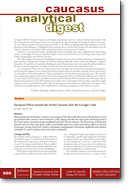Eastern Partnership Civil Society Forum

The View of a Participant from Armenia
Author(s): Gevorg Ter-Gabrielyan
Editor(s): Iris Kempe, Matthias Neumann, Robert Orttung, Jeronim Perovic, Lili Di Puppo, Hans Gutbrod
Series: Caucasus Analytical Digest (CAD)
Issue: 36
Pages: 9-12
Publisher(s): Center for Security Studies (CSS), ETH Zurich; Research Centre for East European Studies, University of Bremen; Institute for European, Russian and Eurasian Studies, George Washington University
Publication Year: 2012
